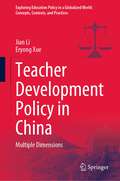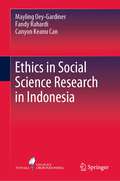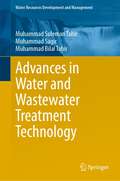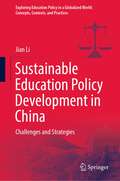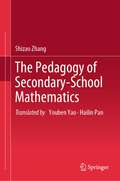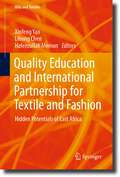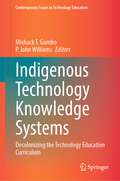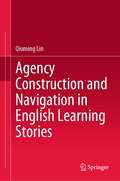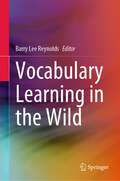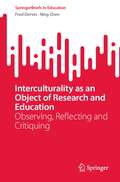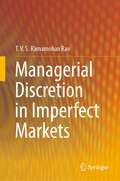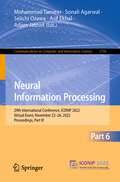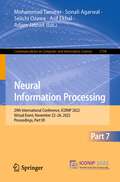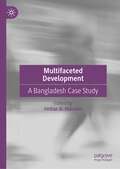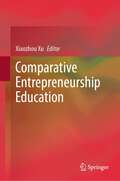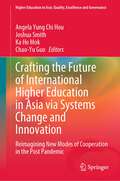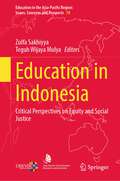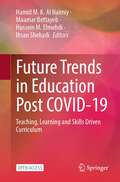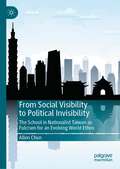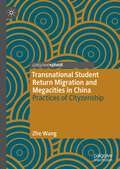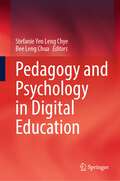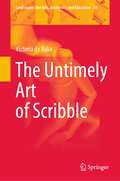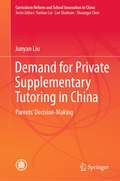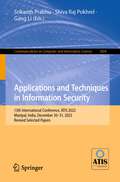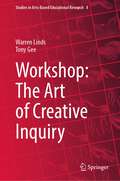- Table View
- List View
Teacher Development Policy in China: Multiple Dimensions (Exploring Education Policy in a Globalized World: Concepts, Contexts, and Practices)
by Jian Li Eryong XueThis book comprehensively explores the teacher development policy in China from multiple dimensions. It examines the leading value of 'Four Good Teachers', teacher salary management policy, teacher evaluation policy, teachers’ professional title appointment policy, teachers’ ethic policy in China’s education system, 'County management and school recruitment' policy in teacher management, teachers’ honor recognition policy, and teachers’ qualification management and policy in China. This book not only shares in-depth understanding to epitomize teacher development policies in China contextually, but also provides specific suggestions to address various challenges of teacher development policies both nationally and locally.
Ethics in Social Science Research in Indonesia
by Mayling Oey-Gardiner Fandy Rahardi Canyon Keanu CanThis textbook presents ethical guidelines for conducting research in the social sciences, focused on Indonesia. As a country with a fast-growing research environment, the real-life cases of ethical issues that arise in Indonesia can teach both aspiring and established researchers how to approach the complexity of research ethics and dilemmas. With technological advancement affecting how research is conducted, the necessary ethical guidelines for research are also evolving. The instantaneous nature of information movement has made confidentiality in research data more critical than before, and any negligence in protecting research participants has an unprecedented scope of damage. The methods book synthesises hundreds of worldwide ethical guidelines and past issues that social science researchers will find highly relevant. Arranged chronologically to represent each research stage—from research preparation to post-research—the book prepares researchers to mitigate ethical crises. Relevant to all social scientists, both emerging and established, conducting research in Indonesia, this co-published textbook between Springer and OBOR is also relevant to researchers beyond the archipelago. It is also an indispensable teaching resource for lecturers in research methods and ethics across social science disciplines.
Advances in Water and Wastewater Treatment Technology (Water Resources Development and Management)
by Muhammad Suleman Tahir Muhammad Sagir Muhammad Bilal TahirThis book highlights the several pollutants and their derivatives that exist in water and wastewater, such as pharmaceuticals, antibiotics, personal care products, heavy metals, pesticides, dyes etc., as a result of rapid urbanization and industrialization. Several part pollution is caused by nutrients, organics, and contaminants with low concentration but is highly toxic to human and aquatic environment. This book provides a holistic approach in terms of measurement, monitoring, and recent advances in treatment technologies for water and wastewater treatment and water reuse. The technologies involve the physio-chemical, biological and advanced oxidation processes in which they are modified or coupled with nanomaterials and/or newly developed products for improving the performance of the current treatment processes. In addition, the membrane processes include recent research on the removal of challenging chemicals by various membrane bioreactors and reverse osmosis processes.
Sustainable Education Policy Development in China: Challenges and Strategies (Exploring Education Policy in a Globalized World: Concepts, Contexts, and Practices)
by Jian LiThis book investigates the sustainable education policy development in China in the aspects of challenges and strategies. In this book, the conceptual model of the sustainable education policy development in China is divided into several parts, including the sustainable development of preschool education, the sustainable development of ethnic education, the sustainable development of vocational education, the sustainable development of higher education, and the sustainable development of lifelong learning. This book serves as a reference for scholars and researchers who are interested and work in research on China’s sustainable education policy development, administrators, and stakeholders in China's education system and graduate students who major or minor in the field of comparative and international education.
The Pedagogy of Secondary-School Mathematics
by Shizao ZhangThis book elucidates the principal aspects and characteristics of secondary school mathematics teaching and learning in China. It combines the cultivation of students' mathematical abilities with the improvement of teaching skills, and explores from both theory and practice to create mathematical pedagogy which has been widely recognized by experts in this field. This book presents a number of mathematics teaching principles and methods, and has been used as an important resource book for mathematics teachers’ education.
Quality Education and International Partnership for Textile and Fashion: Hidden Potentials of East Africa (SDGs and Textiles)
by Xinfeng Yan Lihong Chen Hafeezullah MemonThis book mainly focuses on SDG4- Quality Education, and aims to understand the past, present, and future of textile, fashion, apparel, and related study majors of East African countries. Professors and field experts in textile engineering of selected countries describe the potential and prospects of textile education and how it can lead to internationalization in the various chapters. It also discusses the textile university alliance and the potential for international education related to textiles in the developing region. With updated illustrations, images, data, graphs and tables, this book serves as a reference book for universities with textile engineering major in countries throughout the world.
Indigenous Technology Knowledge Systems: Decolonizing the Technology Education Curriculum (Contemporary Issues in Technology Education)
by Mishack T. Gumbo P. John WilliamsThere has been a growing interest in indigenous knowledge systems and research. This interest has been mainly triggered by the need to decolonize education as a response to the colonial onslaught on indigenous knowledge and people. Research has, however, concentrated on the generality of the indigenous knowledge system rather than on its related dimensions. One area that has suffered a lack of attention is indigenous conceptions of science, technology, engineering, and mathematics (STEM) despite the unquestionable evidence of STEM in indigenous contexts. Most STEM is presented by colonial establishments and representations, especially in developed/modern/urban contexts, which portray STEM as a colonial construct. This book focuses on indigenous technological knowledge systems education (ITKSE). Indigenous people have been at the front of technological developments from pre-colonial times. The list of precolonial industries, science, and technology is extensive, including blacksmithing, wood-carving, textile-weaving and dyeing, leather works, beadworks, pottery making, architecture, agricultural breeding, metal-working, salt production, gold-smithing, copper-smithing, leather-crafting, soap-making, bronze-casting, canoe-building, brewing, glass-making, and agriculture, for example. In some parts of the world such as Africa and Australia, these technologies still exist. ITKSE should not be left to exist outside of the technology education curriculum and classroom as it can benefit both indigenous students, who have been denied learning about what is relevant to them, and non-indigenous students. These cultural groups can expand their knowledge of technology by learning both ITKSE and Western technological knowledge systems education (WTKSE). ITKSE also presents opportunities for technology teachers to reflect on and revisit their depth of technological knowledge, pedagogies, and assessment. The intent of this book is transformational in the sense that it brings decolonial and indigenous perspectives into the technology education context. It extends technology education in the sense that it will not only influence Western-minded architects, artisans, designers, etc. but encourage indigenous-mindedness as well.
Agency Construction and Navigation in English Learning Stories
by Qiuming LinThis book presents a longitudinal research which covers a linguistic approach to understand and observe language learner agency. It makes connections between agency in discourse analyses and agency in applied linguistics by examining how learner agency is manifested in autobiographic oral narratives and influenced by contextual factors. This book also demonstrates that agency is not a fixed entity that English learners possess, but a dynamic construct constantly negotiated by the learners with the social world. It is the result of their identity positioning and repositioning within a complex and ever-changing context. Learner identities, either actual or imagined, are significantly correlated with their investment in English and their English learning process.This book sheds new light on teaching English as a foreign language and gives inspirations for enhancing English learners’ agency in contemporary context of China. As learner agency should be treated in a dynamic and process view, a low level of agency manifested in a particular period or in a certain context may not necessarily persist in later periods or extend to other contexts. Provided with supportive contextual conditions and taking on positive and powerful identities, language learners are well on the course for higher levels of agency.
Vocabulary Learning in the Wild
by Barry Lee ReynoldsThis book provides a timely and valuable resource to explore second language vocabulary learning outside the formal language learning classroom. Rapidly evolving technology and the increasing impact of the global village have resulted in dramatic changes to and increased occasions for second language vocabulary learning. This book offers new and valuable insights into the radically different opportunities both the physical and digital wild provide for language learners to increase their vocabulary knowledge. Practical advice is also given on how second language teachers can integrate vocabulary learning in the wild into their formal classroom instruction. This collection of cutting-edge studies by international experts working within the fields of second language teaching and learning, second language acquisition, applied linguistics, informal language learning, and technology enhanced learning offers an essential resource for language teachers and researchers.The internet is a powerful source of incidental language learning, but this is only part of language learning in the wild. This excellent book shows the range of opportunities available for learning another language outside the classroom in this much neglected research area. --Paul Nation, Emeritus Professor, Victoria University of Wellington
Interculturality as an Object of Research and Education: Observing, Reflecting and Critiquing (SpringerBriefs in Education)
by Fred Dervin Ning ChenThis book proposes a new method for working on the complex and polysemic notion of interculturality, aimed at scholars, students and educators who have an interest in enriching and challenging their own take on this somewhat controversial scientific notion. Multiple examples of observability made by the authors are provided to illustrate the method. The book helps readers to look at themselves as ‘producers’, ‘consumers’ and ‘promoters’ of selected knowledge of interculturality. This book represents an original contribution to the field, by introducing the importance of observation and reflexivity in building up varied epistemic engagements with the notion of interculturality.
Managerial Discretion in Imperfect Markets
by T. V. Ramamohan RaoThis book deals with behavioral responses of management of firms that make several decisions with respect to production, marketing, finance, organization of activities within divisions, and interrelations between divisions (including synergies between them and constraints placed on each other in the attainment of overall goals of the firm). The market conditions, that constitute the basis of such decisions, may be stable, random but predictable, or uncertain. It can be expected that objectives attained by the firm, as a result of decisions of management, may be different from the maximum which can be achieved. A generic conceptualization of such managerial discretion and operationally useful methods of measurement have been presented. It is possible to develop machine learning algorithms on this basis to minimize managerial discretion and assist managers in arriving at strategic decisions thereby leaving more resources to deal with uncertain events as they arise. The volume is a great resource not only for researchers, but also decision makers in corporates.
Neural Information Processing: 29th International Conference, ICONIP 2022, Virtual Event, November 22–26, 2022, Proceedings, Part VI (Communications in Computer and Information Science #1793)
by Mohammad Tanveer Sonali Agarwal Seiichi Ozawa Asif Ekbal Adam JatowtThe four-volume set CCIS 1791, 1792, 1793 and 1794 constitutes the refereed proceedings of the 29th International Conference on Neural Information Processing, ICONIP 2022, held as a virtual event, November 22–26, 2022. The 213 papers presented in the proceedings set were carefully reviewed and selected from 810 submissions. They were organized in topical sections as follows: Theory and Algorithms; Cognitive Neurosciences; Human Centered Computing; and Applications.The ICONIP conference aims to provide a leading international forum for researchers, scientists, and industry professionals who are working in neuroscience, neural networks, deep learning, and related fields to share their new ideas, progress, and achievements.
Neural Information Processing: 29th International Conference, ICONIP 2022, Virtual Event, November 22–26, 2022, Proceedings, Part VII (Communications in Computer and Information Science #1794)
by Mohammad Tanveer Sonali Agarwal Seiichi Ozawa Asif Ekbal Adam JatowtThe four-volume set CCIS 1791, 1792, 1793 and 1794 constitutes the refereed proceedings of the 29th International Conference on Neural Information Processing, ICONIP 2022, held as a virtual event, November 22–26, 2022. The 213 papers presented in the proceedings set were carefully reviewed and selected from 810 submissions. They were organized in topical sections as follows: Theory and Algorithms; Cognitive Neurosciences; Human Centered Computing; and Applications.The ICONIP conference aims to provide a leading international forum for researchers, scientists, and industry professionals who are working in neuroscience, neural networks, deep learning, and related fields to share their new ideas, progress, and achievements.
Multifaceted Development: A Bangladesh Case Study
by Imtiaz A. HussainThis book focuses on the modernization of Bangladesh. It does so by including case studies at the national and sub-national government levels and comparative studies with other countries.Chapters in the book highlight how a number of aspects have been affected in the modernization process, such as the adoption of ‘western’ curriculum and English language in schools, the use of animation to boost school student comprehension of texts, the rural–urban divide, pedagogical training to emergent andragogy-dependent market needs, converting ‘local ’ shipping experiences to fill growing ‘global ’ needs, and multilateral environmental adaptation and mitigation mandates being adopted ‘locally.’
Comparative Entrepreneurship Education
by Xiaozhou XuThis book systematically compares the innovation and entrepreneurship education (IEE) in the United States, the United Kingdom, Finland, Germany, Croatia, Canada, South Korea, and China. The book invites the most distinguished professors of each country in this field to contribute. It provides a context analysis that can lead to greater insight into why and how IEE has become an important government agenda and an institutional priority in different country settings. Following the context, each chapter analyzes governmental policies and the guidance of entrepreneurship education in recent years. This book also analyzes the internal development and supporting system of IEE from an ecosystem perspective. Based on the comparison of case countries, the book puts forwards the common successful experience and the differentiation of IEE.
Crafting the Future of International Higher Education in Asia via Systems Change and Innovation: Reimagining New Modes of Cooperation in the Post Pandemic (Higher Education in Asia: Quality, Excellence and Governance)
by Angela Yung Chi Hou Joshua Smith Ka Ho Mok Chao-Yu GuoThe book discusses the most essential topics in understanding the development and changes of higher educational systems in Asia after the outbreak of the pandemic, and explores the transformative, international and innovative moves from an Asian perspective. The topics covered in the book are timely in that higher education in Asia was severely limited during the tumultuous time of the pandemic, including three themes- 1. How the pandemic drives system reform and quality management; 2. How can universities maintain transnational partnerships and attract global talent; 3. How would faculty members innovate teaching pedagogy and reassess student learning experiences.This timely and well-researched book provides valuable insights into the challenges and opportunities for national, regional, and international higher education created by the recent pandemic as well as technological and geopolitical changes. The lucid analysis of key issues and trends will be useful to academics, policymakers, and researchers within Asia and beyond.Professor Jane Knight, Ontario Institute for studies in Education, University of TorontoThis book sets out important thinking for the post-pandemic era in Asian higher education. Based on valuable experience across a diverse region, this book highlights the opportunity to reimagine the future trajectory for higher education. As more of the Asia-Pacific moves toward mass and even universal systems of higher education, it exerts greater influence on higher education around the world. This book offers practical analysis that is culturally grounded in the rich civilizations of Asia about ubiquitous issues in higher education, including social equity, human agency, program quality, innovative pedagogy, academic governance, private sector initiative, knowledge building, and a new form of internationalization. It offers a sensible launchpad for a policy agenda.Professor Gerard Postiglione, Emeritus Professor, The University of Hong Kong
Education in Indonesia: Critical Perspectives on Equity and Social Justice (Education in the Asia-Pacific Region: Issues, Concerns and Prospects #70)
by Zulfa Sakhiyya Teguh Wijaya MulyaThis book offers a critical analysis on Indonesian education by drawing from various critical perspectives and theoretical frameworks to explore persistent challenges and social inequality problems in the education sector. Critical perspectives are important to reveal how education is not a neutral, mechanistic process of cultivating the knowledge and skills of future generation. Instead, it is a battleground in which competing visions, ideologies, discourses, religious values, and political interests struggle for dominance in a given society. In each of the sections, contributors draw upon specific case studies and employ critical theories to analyze power relations or to identify and destabilize underlying structures, dominant discourses, hegemonic knowledge, policies, or practices. Some authors also highlight data evidencing inequities, inequalities, or injustices in Indonesian education system. As a handbook, the emphasis on critical perspectives is useful to identify and evaluate the ‘blind spots’ of dominant policy discourses and their pedagogical consequences. The plurality of critical approaches also means that this book is necessarily multidisciplinary. A unique feature of this book is the fact that most authors are Indonesian academics who bring with them tacit knowledge of practices and issues. Overall, this book enriches the literature by bringing together different disciplinary perspectives such as political science, psychology, international relations, economics, and linguistics to critically examine important issues related to education in Indonesia.
Future Trends in Education Post COVID-19: Teaching, Learning and Skills Driven Curriculum
by Hamid M. K. Al Naimiy Maamar Bettayeb Hussein M. Elmehdi Ihsan ShehadiThis open access book presents the proceedings of the first post COVID-19 conference on Education at the University of Sharjah, United Arab Emirates, on March 14-16, 2022. The book offers state-of-the-art approaches and methodologies in education post-COVID-19. It showcases emerging technology utilization in improving the quality of education, teaching and learning. It discusses the transformation of the curriculum, such as course design and delivery, assessment, and instructional methodologies that focus on employment readiness for the ever-evolving job market. Contributions include a wide range of topics such as online education, curriculum development, artificial intelligence, academic accreditation for hybrid & online learning. Given its scope, the book is essential reading for scholars, students, policy-makers, and education practitioners interested in a better understanding of technological innovations.
From Social Visibility to Political Invisibility: The School in Nationalist Taiwan as Fulcrum for an Evolving World Ethos
by Allen ChunThis book began as a year-long ethnography of a school in Taiwan in 1991 then evolved more into a historical sociology of national formation and its cultural mindset. Cultural nationalism is a widely debated but poorly understood process. Contrary to prevailing perceptions, the Cold War may have given way to a more progressive open society, but the politicization of ethnicity hardened a more deeply entrenched cultural frame of mind. Instead of liberating an indigenous reality, Taiwanese consciousness has ironically polarized the political dead ends of reunification and independence. In the final analysis, the ethnography can serve as a paradigmatic case study for critical cultural studies. There are clear ramifications also for a comparative study of the cultural politics of other Chinese speaking or Asian societies and their histories.
Transnational Student Return Migration and Megacities in China: Practices of Cityzenship
by Zhe WangThis book is a study of the return migration of overseas Chinese students. By 2018, over 3.5 million Chinese students had returned from overseas universities to China, with the megacities of Beijing, Shanghai, and Shenzhen representing by far their main destinations. In other words, when overseas students return to China, many do not return to their hometown but usually land, work and settle down in Beijing, Shanghai and Shenzhen. Their return migration is thus not only transnational, but also internal-urban. This book adopts a multi-level geographical analysis to explore this important phenomenon, exploring why and how returnees choose these three cities and how they experience and interpret their everyday lives in these megacities after their return. In doing so, it highlights the importance of cultural logics and multiscalar thinking of transnational Chinese students’ return migration and illuminates how their transnational migration reproduces domestic socio-spatial inequalities. This book brings an important contribution to the fields of Cultural Geography, Urban Geography, Transnationalism, Migration Studies and Citizenship Studies.
Pedagogy and Psychology in Digital Education
by Stefanie Yen Leng Chye Bee Leng ChuaThis book brings together latest research which explores the intersection between educational psychology and educational technology. It consolidates contemporary research on the psychological dimension of technology-based learning, and how new learning technologies can impact learners. More specifically, it provides a better understanding of the affordances of technology-based learning, and how they impact the cognitive and affective processes of learners, facilitate new pedagogical approaches, and transform learning environments. It discusses how technology can be used to develop twenty-first-century competencies such as creativity, critical thinking, problem-solving skills, digital literacy, reflection, and lifelong learning, and explores the pitfalls, challenges and dangers therein.
The Untimely Art of Scribble (Landscapes: the Arts, Aesthetics, and Education #34)
by Victoria de RijkeThis book offers new definitions, vocabularies and insights for “scribbling”, viewing it as a fascinating and revealing process shared by many different disciplines and practices. The book provides a fresh and timely perspective on the nature of mark making and the persistence of the gestural impulse from the earliest graphic marks to the most sophisticated artistic production. The typical treatment of scribbling in the literature of artistic development has cast the practice as a prelude to representation in drawing and writing, with only occasional acknowledgment of the continuing joy and experiment of making marks across many arts practices. The continuous line the author traces between the universal practice of scribbling in infancy and early childhood and the work of radical creativity for contemporary and historical artists is original and clarifying, expanding the range of drawing behaviors to that of avant-garde painters, performance and the digital.
Demand for Private Supplementary Tutoring in China: Parents' Decision-Making (Curriculum Reform and School Innovation in China)
by Junyan LiuThis book combines the ideologies of parentocracy and consumer theory as theoretical lenses to view the private supplementary tutoring, also known as shadow education, with a focus on the demand at primary and lower secondary levels in China. It first explains parents’ motivations of seeking private tutoring and their decision-making dynamics, and then explores the evolving micro-level process of demand that has changed over time. It further investigates how demand for private tutoring varies across parental socioeconomic status. This book also discusses parents’ attitudes towards the Double Reduction policy and corresponding changes in their demand for tutoring. It concludes with some implications for regulating private tutoring and for improving school education. This book has pertinence in other countries as well as in China. Unpacking the demand for tutoring improves understanding of the global expansion and changing shapes of the phenomenon.Researchers, educational policy-makers, teachers, tutors, consultants, and other educational practitioners interested in the topic of private tutoring will find this work thought-provoking, instructive and informative.
Applications and Techniques in Information Security: 13th International Conference, ATIS 2022, Manipal, India, December 30–31, 2022, Revised Selected Papers (Communications in Computer and Information Science #1804)
by Srikanth Prabhu Shiva Raj Pokhrel Gang LiThis book constitutes the refereed proceedings of the 13th International Conference, on Applications and Techniques in Information Security, ATIS 2022, held in Manipal, India, December 30–31, 2022.The 23 full papers included in this book were carefully reviewed and selected from 121 submissions. They were organized in topical sections as follows: Privacy and Security, Advances in Machine Learning, Cloud, IoT and Computing Technologies.
Workshop: The Art of Creative Inquiry (Studies in Arts-Based Educational Research #8)
by Warren Linds Tony GeeThis book explores tools and techniques for creating the arts with groups. It provides insights into why workshops are such an effective and relevant form of creative practice. Throughout, two experienced practitioners share successful principles and qualities. They also include examples of workshops that explore ways of facilitating creative exploration.The authors believe that underpinning any good workshop practice is an understanding of what constitutes a workshop. This is a process in which the relationship between artist/researcher and participant/audience, maker, and witness is fluid. It extends each individual’s abilities and connects doing to learning to inquiring in a single process. The book itself is a dialogue on, and an investigation into, this practice. It fully explores the specificities of workshop practice in relation to how it engages others in arts-based research.Readers learn how workshops involve inquiry into six areas: inquiry into subjects, artistic processes, skills, self, the world, and relationships with others. In the end, this informed investigation helps practitioners to better reflect on their own approaches to arts-based inquiry and research. This, in turn, leads to a better understanding of how readers can use workshops for the maximum benefit of all participants, both individuals and groups.
